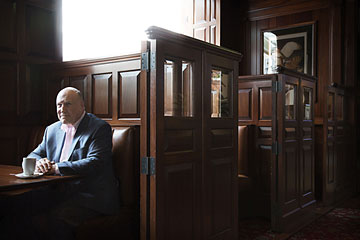
(2 of 4)
If you watch Fox News, you may have already seen the latest ad. A couple are dining at a restaurant when their waiter suddenly evaporates, leaving an iPad in his place. "Every time you use a self-checkout lane or even a touchscreen ordering system, it's a task that used to be part of someone's job description," a narrator explains gravely. "When you raise the minimum wage, a new government report confirms that up to 1 million jobs will disappear," the voice continues, referring to the CBO.
The ad, produced by his eponymous public relations firm, is classic Berman. Which is to say blunt. At 6 ft. 3 in., Berman cuts an imposing figure, with his wide-set shoulders and pitched, hairless dome. The 71-year-old speaks in declarative bursts--the sound bites seem to come without effort--with a hint of his native Bronx accent. Supporters think of him as the Wayne LaPierre of the restaurant industry, a true believer unafraid to talk straight. "People are not paid based on what they need," Berman says. "They are paid based on what they can contribute." He complains about the backlash against unpaid internships: "Quite frankly, I think people should be allowed to work for nothing."
As a young man, Berman worked at his father's gas station, pumping fuel and hustling for tips. After the New York Supreme Court struck down a law prohibiting self-service in 1967 he was surprised, he says, by how few people, when given the choice, were willing to pay for service. "Women would show up dressed for business in heels" and wait in line to pump their own gas, he recalls. After college, Berman earned a law degree from William and Mary and took a position as a labor lawyer at Bethlehem Steel. The experience of watching his employers haggle over contracts with labor unions thriving during boom times for American manufacturing sharpened his ideology. Unions, he says, tend to be self-righteous, and they overreach--often to the detriment of their members.
Berman went to work for the restaurant industry in 1975, eventually opening his own public relations shop in the late 1980s. Over the years, the industry has come to rely on his spin-doctoring during times of crisis--efforts to enact stricter drunk-driving laws in 1999 ("a prohibitionist rage sweeping through public life," Berman wrote), a 2006 E. coli outbreak (which actually showed "just how safe our food supply generally is") and more-recent attempts to restrict calorie counts ("busybody nannying"). Near the door to Berman's Washington, D.C., office, there's a framed copy of one of his firm's ads depicting then New York City mayor Michael Bloomberg as a nanny.
Berman became an especially controversial figure by levying personal attacks against his opponents, such as MADD, PETA and scores of restaurant-worker advocates, including unions. The nonprofits and trade groups in his network--they include the American Beverage Institute and the Center for Consumer Freedom--have also come under fire from the left-leaning watchdog Citizens for Responsibility & Ethics in Washington for not disclosing the donors that fund them.
